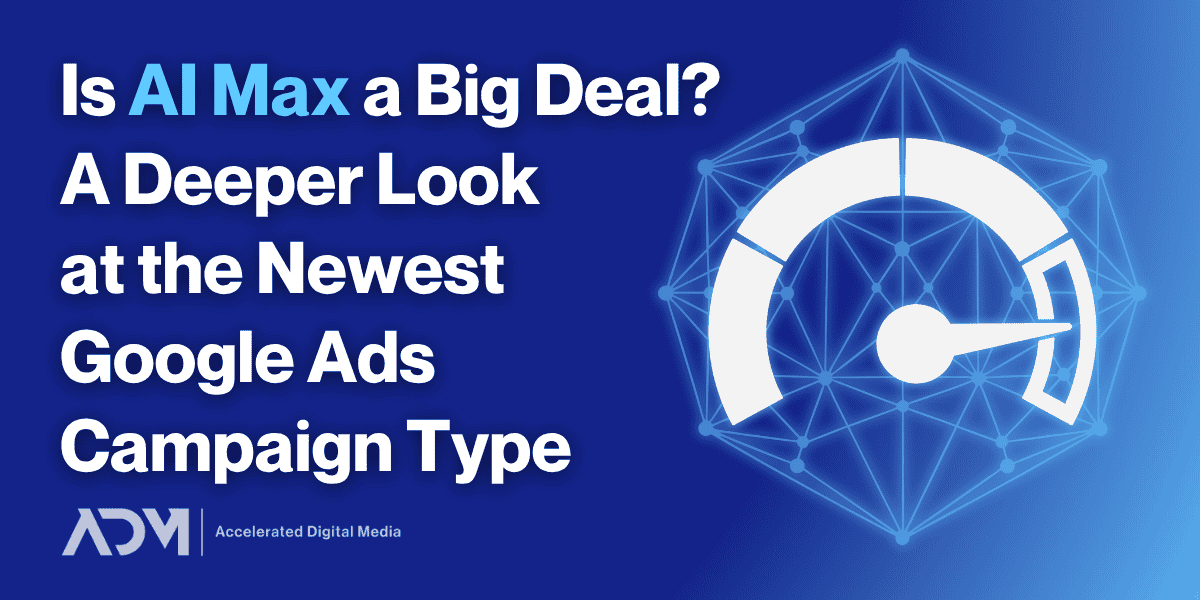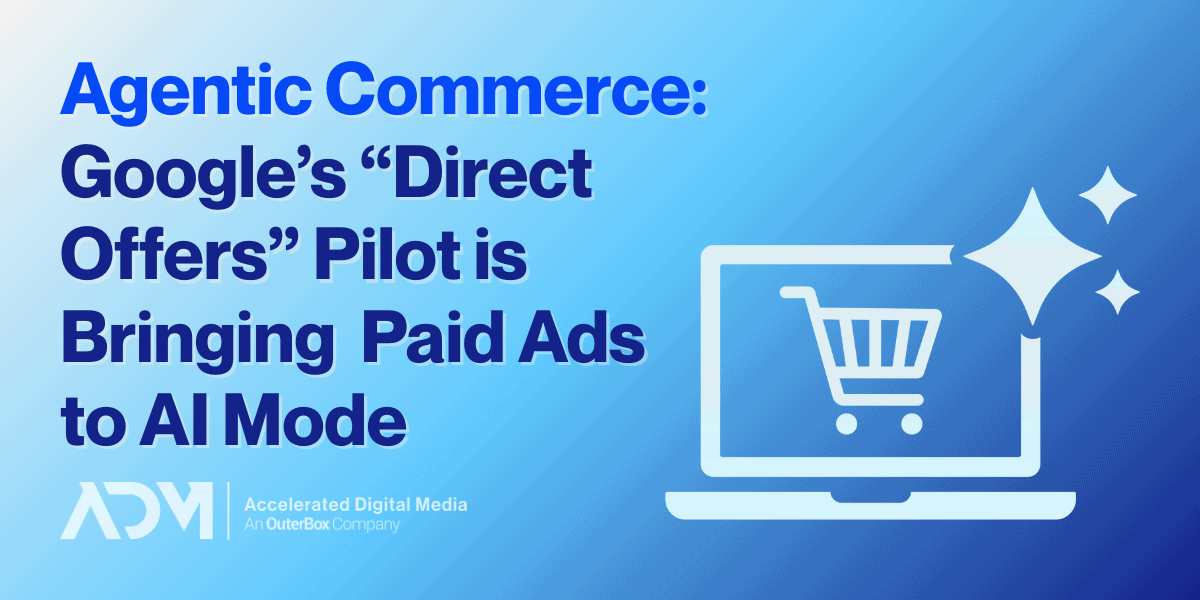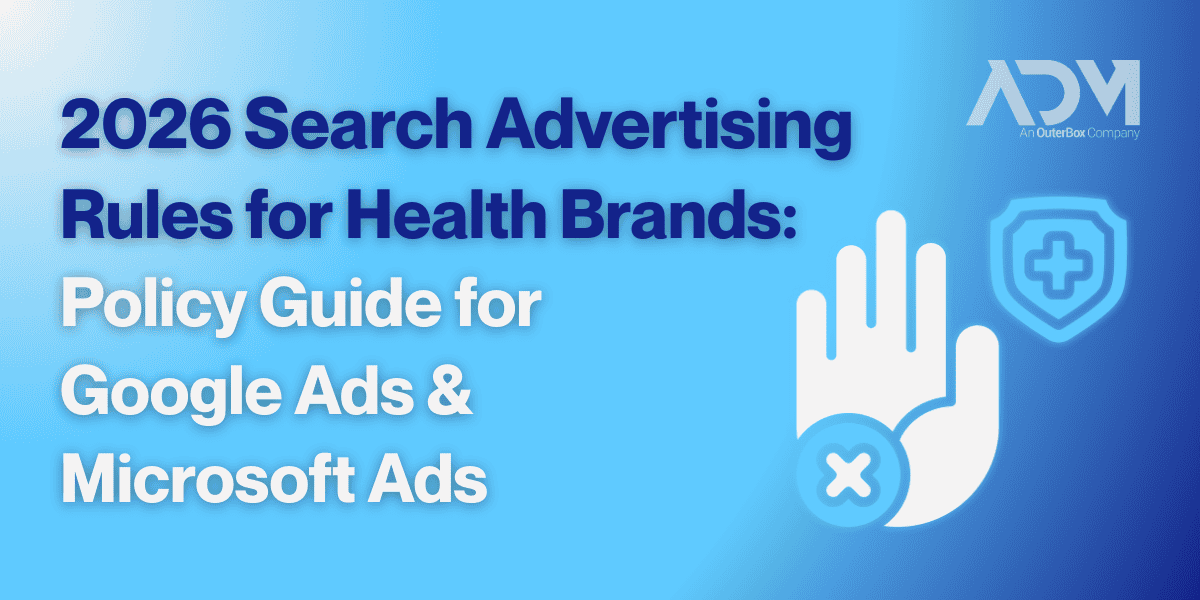At Google’s GML event this spring, the digital giant announced a huge array of new Google Ads updates that advertisers are eager to begin testing and deploying. The one that has drawn the most attention has been AI Max, a paid search concept that uses landing pages and site content to automatically generate ads and target queries based on user intent—even if you aren’t already targeting those keywords in your account.
To us, AI Max at first sounded a lot like an existing feature—Dynamic Search Ads (DSAs)—but with a few caveats. Since it has emerged as one of the most intriguing Google Ads updates to come out of GML 2025, we decided to take a longer look at those similarities, the new advantages that AI Max might offer, and concerns and unanswered questions we have based on Google’s early rollout.
What is AI Max and How is It Different from Dynamic Search Ads?
Like Dynamic Search Ads, AI Max draws ad content (like headlines) from your website and are able to target without predefined keywords. Unlike DSAs, AI Max is not a totally separate campaign type. Instead, it’s more of a modification for Search campaigns which will use Broad match keywords only—think of it as ”Broad Match Plus,” if you will.
DSAs rely almost exclusively on page crawls to determine what to include in headlines, which queries are relevant, and even which landing pages to use. In contrast, Google has been telling advertisers that AI Max will actually allow greater control over when and where their ads show, as well as what they’re publishing.
The major differentiator there is that AI Max can be used in conjunction with keywords while also allowing advertisers to maintain their guardrails through the same campaign features and settings available in standard Search campaigns. AI Max allows advertisers to decide to use their own text or rely on Google’s generative AI to create entirely new text in real time based on the user query and landing page combo.
What Will AI Max Be Good For?
Though it’s impossible to fully understand AI Max’s utility until we’ve had more time to test it, we think AI Max will primarily benefit larger accounts that need to reach more users at lower costs.
With cost per clicks (CPCs) rising steadily each year, paying to play in Search is becoming increasingly difficult for a lot of advertisers to sustain. Our hope is that because this new AI-based product is going to be able to serve ads for an even broader number of Search queries, it will ultimately reduce the saturation in Google’s auction space (ie: reduce competition) and lower that prohibitive cost that many brands are struggling with. Ideally, we hope it will prevent clients from having to constantly scale their budgets just to maintain their existing search relevance—and perhaps unlock some additional conversions along the way
That’s because AI Max might help address a phenomenon that AI itself is creating—which is that search is becoming less specific and more colloquial. There was a time when search was entirely text-based and users searched almost exclusively using short phrases, but things have evolved dramatically from search queries to search conversations.
A query like “electric guitars” is very vague and unclear what the user’s intent is—Does the user want to learn about them? Learn to play one? Do they want to buy one? If so, which out of the thousands on the market? Do they need repairs? As Search has become more colloquial and more of a back-and-forth conversation with our “virtual assistants” like Google’s built-in AI, the number of possibilities for queries that contain the phrase “electric guitar” have ballooned to be in the dozens, meaning users aren’t simply using the short phrase any longer.
What was once a simple search for “electric guitar” might now start with “where can I get my electric guitar repaired?” This could be followed by several follow up queries and ultimately end with something like “directions to City Music Co.”—a query that doesn’t technically have anything to do with “electric guitar.” However, with the additional context we’re assuming AI is capturing by monitoring that ongoing search conversation that led to that query, City Music Co. might still want to serve an ad to that user at this point in the conversation.
AI Max seems designed to thrive in exactly this kind of search environment—one where user intent isn’t revealed in a single keyword, but instead unfolds across a series of connected, conversational queries. By using AI to interpret these longer journeys and synthesize context from earlier searches, the goal is to stay visible throughout the search conversation, even when the keywords themselves don’t directly match their offerings. AI Max may help advertisers to show up for the full path, not just the first step.
How Does AI Max Fit Into Your Broader Google Ads Strategy?
Google is branding AI Max as part of its so-called “Power Pack,” a trio of AI-powered campaigns that also includes Performance Max and Demand Gen. The idea is that these three will cover all of the mediums that Google Ads has access to—Search, Shopping, YouTube Ads, Display, and more—to give advertisers more seamless and comprehensive capabilities with fewer campaigns.
Performance Max already includes Search ads among its many applications, but our assumption is that AI Max will be here to “fill in the gaps” as the dedicated Paid Search option of the three. If nothing else, the new campaign type is a way for Google to extend its reach and earn some incremental revenue by serving your ads to a broader catalog of queries.
Technically, Performance Max (and, to an extent, standard Search campaigns that rely entirely on Broad Match keywords) could already do that. But it’s in Google’s best interest not to let AI Max have too much overlap with anything that’s already running. From Google’s perspective, AI Max only really makes sense for Google if it’s getting advertisers into new auctions.
What Concerns Do We Have About AI Max?
We approach any new Google Ads feature—especially ones of the AI-powered variety—with both cautious optimism and healthy skepticism. Meaning, as always, we have some initial concerns about AI Max.
The first is cannibalization—because the campaign is designed to expand keywording capabilities, there is always the risk that bites into the performance of other campaigns, like Performance Max and standard Broad Match-focused Search campaigns. Because it’s a new campaign type, it’s uncertain how significant this effect will be and what changes advertisers will need to make to their existing campaign types to accommodate AI Max and avoid this cannibalization.
The other concerns revolve around control and reporting. In many cases, AI-powered campaigns force advertisers to cede granular control over their campaign performance in favor of the algorithms, and often give very little insight into who your ads are reaching and how they’re generating the in-platform performance numbers they achieve.
When Performance Max launched, Google more or less told advertisers to trust the automation and not worry about how the money’s being spent. The problem with that is it left us with no real way to optimize those campaigns. Even if we did, we wouldn’t really know where to start.
After launching Performance Max, Google received a couple of years of backlash from advertisers over its lack of visibility before it finally caved and started making more data accessible in-platform. Google has recently worked to make Performance Max and Demand Gen more transparent and thus more optimizable, finally giving access to things like search query insights, landing page performance, placement information (if applicable), where spend is being allocated, etc.
While it would be nice if, at launch, AI Max came with that level of insight—but we wouldn’t be surprised if it debuts in a similarly opaque fashion.
So, is AI Max a Big Deal?
While AI Max does seem to offer some benefits, in our honest opinion it perhaps doesn’t seem like as novel of a tool as Google has so-far portrayed it as. With its similarities to DSAs, capabilities that seemingly carry over from other technology like Performance Max and Broad Match keywords, and the concerns we’ve stated above, we’re looking at it as more of a natural evolution than a total revolution. For now.
That doesn’t mean we aren’t eager to begin testing AI Max for our clients—we put every new marketing tool that Google provides through the same rigor to try to create the best Google Ads programs possible for our clients. Given the way that Google has rolled out AI-powered tools in the past, it may take some time before this new campaign type truly comes into its own and emerges as a game-changer.
If you’re looking to work with a Google Premier Partner agency that’s committed to testing and validating every marketing tool at its disposal, consider reaching out to the ADM team today:



